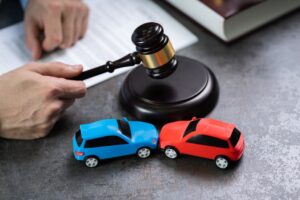Buffalo, New York’s top three attractions - the awe-inspiring Niagara Falls, the historic Buffalo and Erie County Naval & Military Park, and the renowned Anchor Bar - draw massive crowds.
The sheer volume of traffic converging on these iconic landmarks creates congested roadways and heightened risks for vehicular collisions. Niagara Falls, a natural wonder that captivates millions of visitors annually, generates significant traffic congestion.
The decommissioned naval vessels at the Buffalo and Erie County Naval & Military Park attract history enthusiasts, further contributing to the city’s busy traffic flow.
Even the legendary Anchor Bar, celebrated as the birthplace of the world-famous Buffalo Wings, sees a constant stream of visitors navigating the streets.
These top attractions alone transform Buffalo into a bustling metropolis where car accidents are all too common.
Car accidents happen in Buffalo no matter how careful you are. The wisest choice you can make is to hire an experienced Buffalo car accident attorney to help you win a settlement.
- Kensington Expressway (NY 33): This expressway passes through Buffalo and has a history of accidents due to its high traffic volume, frequent congestion, and challenging merges.
- Scajaquada Expressway (NY 198): This expressway runs through Delaware Park and has had several accidents, some of which have been fatal. This has led to calls for redesigning it to reduce speeds and improve safety for pedestrians and cyclists.
- Interstate 190: This interstate passes through Buffalo, and while it’s a crucial transportation route, it can be dangerous during winter due to snow and ice.
- Main Street: Particularly in downtown Buffalo, Main Street can be congested and prone to accidents, especially during rush hours.
- Bailey Avenue: This road is known for accidents and traffic congestion, especially in certain sections.
What Are the Typical Causes of Car Accidents?

The most often recorded types of car accidents in Buffalo include:
- Distracted driving tops the list, with drivers taking their eyes off the road to text, adjust music, or get lost in thought - even a split second of distraction significantly increases collision risks.
- Speeding is another major culprit, as excessive speed reduces reaction times and increases the severity of impacts.
- Driving under the influence of alcohol or drugs impairs judgment, reflexes, and cognitive abilities, making accidents far more likely.
These three factors - distraction, speeding, and impairment - account for a staggering number of preventable accidents that occur on Buffalo’s streets annually.
What Are the Most Common Injuries in a Car Accident in Buffalo?
Based on common patterns in the urban areas, some of the most frequent types of car accidents include:
- Rear-end collisions - Often caused by distracted driving, tailgating, or sudden braking. These can occur at intersections or on highways.
- Side-impact accidents - Commonly happen at intersections when one vehicle fails to yield the right-of-way and strikes the side of another auto.
- Single-vehicle crashes - Can result from speeding, impaired driving, or losing control, leading to the vehicle striking objects like trees, poles, or rolling over.
- Pedestrian/bicycle accidents - Higher risks in areas with heavy foot traffic, often due to drivers not yielding properly or pedestrian/cyclist error.
- Parking lot incidents - Low-speed collisions while maneuvering in tight spaces or backing out of spaces.
- Multi-vehicle pileups - More likely on major highways/interstates due to chain reaction crashes from sudden braking.
Addressing the root causes and injuries through education, enforcement, and personal responsibility could go a long way in improving road safety in the city.
What Damages Can I Claim After a New York Car Accident?
Depending on your circumstances, you may claim damages, including:
Medical expenses
You can claim compensation for all reasonable and necessary medical costs related to treating injuries from the accident. This includes hospital bills, doctor visits, medication, physical therapy, and future medical expenses.
Lost wages
If your injuries caused you to miss work, you can claim compensation for your lost wages during your recovery period. This may also include future lost earnings if you cannot return to the same line of work.
Property damage
You can seek reimbursement for repairing or replacing your vehicle and any other personal property damaged or destroyed in the accident.
Pain and suffering
In addition to economic damages, you may be able to claim non-economic damages for the physical pain, emotional distress, and diminished quality of life resulting from your injuries.
Loss of consortium
If the accident has negatively impacted your relationship with your spouse, you or your spouse may claim damages for loss of consortium, which includes loss of companionship, affection, and household services.
Punitive damages
In cases where the at-fault driver’s conduct was particularly egregious or reckless, such as driving under the influence or excessive speeding, the court might award punitive damages to punish the driver and deter similar behavior.
New York follows a comparative negligence system, which means your compensation is reduced if you are partially responsible for the accident.
Consulting an experienced personal injury attorney can recover the full compensation you deserve under New York law.
Car Accidents and Your Mental Health
Experiencing a car accident can have profound and lasting effects on a person’s mental health, often leading to the development of post-traumatic stress disorder (PTSD).
PTSD is a psychiatric disorder that can occur in individuals who have experienced or witnessed a traumatic event, such as a severe car accident.
Symptoms of PTSD vary, including flashbacks, nightmares, intrusive thoughts, hypervigilance, avoidance of reminders of the trauma, and mood disturbances.
For car accident survivors, PTSD is triggered by reminders of the accident, such as the sound of screeching tires or the sight of a damaged vehicle, causing significant distress and impairment in daily functioning.
These symptoms interfere with the ability to drive or ride in a car, impacting work, relationships, and overall quality of life.
Seeking help from mental health professionals is essential for individuals struggling with PTSD after a car accident and part of the damages claimed in a car accident lawsuit.
What Is the Legal Process to File a Car Accident Claim?

Filing a car accident claim involves several steps, and while the specifics vary depending on the jurisdiction and circumstances of the accident, here’s a general overview of the process:
Seek Medical Attention: The first and most crucial step is to ensure that anyone injured receives prompt medical attention. Even if injuries seem minor at first, it’s essential to get checked out by a healthcare professional.
Report the Accident: Report the accident to the police or relevant authorities. They will document the scene, gather evidence, and create an official report, which can be valuable for your insurance claim and any potential legal proceedings.
Exchange Information: Exchange contact and insurance information with the other driver(s) involved in the accident. This includes names, addresses, phone numbers, insurance policy details, and vehicle information.
Notify Your Insurance Company: Report the accident to your insurance company immediately. Provide them with all relevant details and cooperate with their investigation.
Gather Evidence: Collect evidence from the scene of the accident, such as photographs of the vehicles involved, the location of the accident, road conditions, traffic signs, and any visible injuries. Eyewitness statements can also be valuable.
Consult an Attorney: Call a personal injury attorney, especially if you suffered significant injuries or a dispute over fault or compensation. An attorney can provide legal guidance, negotiate with insurance companies on your behalf, and represent you in court if necessary.
File a Claim: If you decide to pursue compensation for your injuries and damages, you must file a claim with the at-fault driver’s insurance company.
Provide them with all relevant information and documentation, including medical records, repair estimates, and proof of lost wages.
Negotiate Settlement: The insurance company will investigate the claim and may offer a settlement. Your attorney can help negotiate a fair settlement amount that adequately compensates you for your losses.
Litigation: If you can’t settle through negotiation or the insurance company denies your claim, you may need to file a lawsuit and pursue your case in court. This involves formal legal proceedings, including discovery, depositions, and potentially a trial.
Resolution: The legal process concludes with a resolution, which could be a settlement agreement between the parties or a judgment issued by the court if the case goes to trial.
If you win your case, you’ll receive compensation for your damages, but if you lose, you may not receive any compensation, and you could recover court costs and legal fees.
How Does a Car Accident Attorney Help You?
A car accident attorney can provide invaluable assistance to victims in several ways:
- Legal Guidance and Advice: Attorneys are well-versed in personal injury law and can provide victims with legal advice tailored to their specific circumstances. They can explain the victim’s rights, options, and the legal process of pursuing a claim.
- Investigation and Evidence Gathering: Attorneys have the resources and experience to investigate the accident thoroughly. They can gather evidence such as police reports, witness statements, medical records, and expert testimony to strengthen the victim’s case.
- Determining Liability: Determining liability can be complex. Attorneys assess the facts of the case, identify all potentially liable parties, and hold them accountable for their negligence or wrongdoing.
- Negotiating With Insurance Companies: Insurance companies make dealing with them challenging, as they often minimize payouts to victims. Attorneys handle all communications with insurance adjusters, negotiate on behalf of the victim, and work to secure a fair settlement that adequately compensates them for their losses.
- Calculating Damages: Attorneys can help victims accurately calculate the full extent of their damages, including medical expenses, lost wages, property damage, pain and suffering, and future damages such as ongoing medical treatment or disability.
- Litigation Representation: If you can’t reach a fair settlement through negotiation, attorneys are prepared to take the case to court and advocate for the victim’s rights in litigation. They handle all legal proceedings, including filing the lawsuit, conducting discovery, presenting evidence, and representing the victim in court.
- Providing Support and Advocacy: Attorneys provide you compassionate support and advocacy throughout the otherwise overwhelming and stressful legal process, helping you navigate challenges and working tirelessly to achieve the best possible outcome for your case.
Car accident attorneys protect your rights, recover compensation for your losses, and help you move forward with your life after a traumatic accident.
Involved in a Car Accident in Buffalo? Call William Mattar

The legal team at William Mattar Law Offices profoundly understands the pain and worry of car accident cases across New York State. We deal with insurance companies, help gather evidence to prove liability, protect your rights, and fight for the maximum compensation you deserve.
After a Buffalo car crash, contact the dedicated Buffalo personal injury lawyers at William Matter Law Offices for your free consultation. We’re here to handle the legal process so you can focus on recovery and getting your life back on track.
At William Mattar P.C., we focus on helping people who sustained personal injuries after motor vehicle accidents.
With more than 35 years of experience representing thousands of injured victims like you, we know auto accident law.
If you were injured in a car accident involving a motorist with out-of-state insurance, we’re happy to review your case and see if we can help!
Call our office any time at (716) 444-4444 or visit our website to fill out a contact form or chat with us directly.
